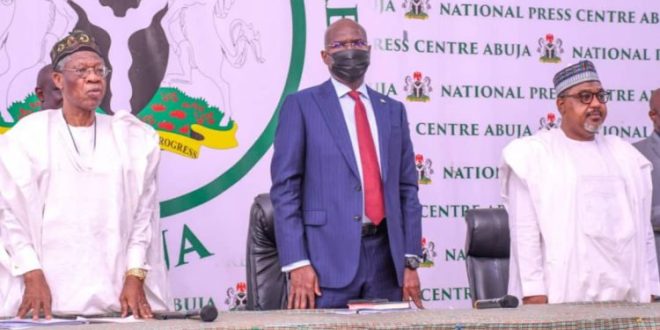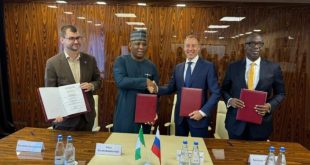After several years of delay, the 2nd Niger Bridge has now been completed and would be opened for use before the end of the President Muhammadu Buhari-led government, Babatunde Fashola, minister of works and housing, confirmed on Wednesday.
Announcing this in Abuja at the inaugural press conference on the scorecard of Buhari’s eight-year administration, Fashola also said that the bridge has not been commissioned due to delays in the completion of its link roads caused by recent flood surge.
The bridge is one of the infrastructure projects handled by the Nigeria Sovereign Investment Authority ((NSIA) under the Presidential Infrastructure Development Fund (PIDF) which the Federal Government assigned to it to manage.
“I can confirm that the 2nd Niger Bridge itself is finished. People can walk through the bridge now unimpeded. What remains is the four-kilometre link road on the Asaba side.
“Right now, our dredger is in place, we have to rebuild the road by reclaiming sand, the recent surge of flood has slowed us down,” the minister told journalists.
He also said that the government, unfortunately, cannot complete the rehabilitation of road projects across the country as planned, due to poor revenues which shrunk budgetary allocations and made the amount released to fund infrastructure projects too meagre.
“The last time Nigeria spent up to N200 billion on infrastructure was in 2002 and this is affecting the amount of road infrastructure we can deliver,” he stressed.
According to him, the total amount released for infrastructure projects from 2016 to 2021 stood at N964.84 billion out of N1.58 trillion budgeted.
He explained that the results achieved so far in road infrastructure were through alternative sources of funding like the PIDF, SUKUK fund, road infrastructure tax credit scheme, multilateral loans and grants, and collaboration with government agencies.
“As much as we wish that everything can be done, the truth is, not everything can be done but we have taken on roads that seem to defy possibilities.
“We have six major priorities which include roads leading to ports, roads leading to agricultural producing areas, mineral producing areas and strategic mineral depot, roads used for distributing petroleum products.
“Other projects of priority include roads that connect tertiary institutions, bridges, and multilateral contracts.
“We have not forsaken any road project, but there are not enough resources to finance them at the same time,” he explained.
According to him, under the SUKUK fund, N362 billion was spent on road projects in three years (2017-2020), with 482 kilometres of road achieved in 2017, 642km achieved in 2018 and 757km achieved in 2020.
The Federal Government also delivered several projects, including the rehabilitation and construction of Lagos-Shagamu-Ibadan dual carriageway, construction of main works, including associated infrastructure for the Second Niger Bridge linking Anambra and Delta States and the rehabilitation of Abuja-Kaduna-Zaria-Kano dual carriageway section I, II and III under the PIDF.
Roads constructed under the Road Infrastructure Tax Credit Scheme (RITCS) include Lokoja-Obajana-Kabba-Illorin Road, Apapa-Wharf Road, Apapa-Oworonshoki-Ojota Expressway, and Bodo-Bonny Road with a bridge across Opobo channels in River State, Fashola noted.
(Business Day)
 National Telescope national telescope newspaper
National Telescope national telescope newspaper


